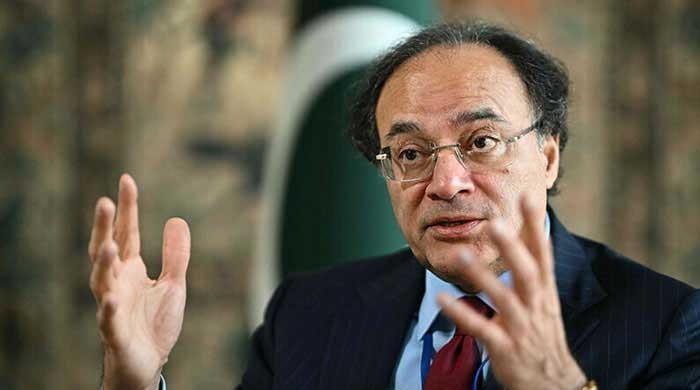- He says inflation has fallen to single digits and policy rates have been eased.
- Highlights: Foreign exchange reserves cover 2.5 months of imports.
- All three rating agencies have upgraded Pakistan’s credit outlook.
Pakistan expects its economy to grow by 3.5% this fiscal year despite flood-related setbacks, Finance Minister Muhammad Aurangzeb said in an interview with CGTN America talk show “Heat,” citing improving stability, falling inflation and strengthening foreign exchange reserves.
Aurangzeb said the current government’s economic measures were bearing fruit as inflation was in single digits and the central bank’s monetary policy was accommodative. “Our foreign exchange reserves are sufficient to cover two and a half months of imports,” the finance czar said.
The economic performance has attracted international recognition, with all three major global rating agencies recently raising the country’s credit outlook, according to the finance minister.
The minister said Pakistan’s gross domestic product (GDP) grew by 3 per cent in the last fiscal year and economic fundamentals continued to strengthen.
“The growth target this year has been set at over 4%, although it could be slightly affected by the recent floods,” the finance minister said.
Aurangzeb also highlighted the progress made in the second phase of the China-Pakistan Economic Corridor (CPEC), saying 24 joint projects were signed in Beijing recently. “New investment opportunities are also being explored,” he added.
Pakistan and the International Monetary Fund (IMF) have reached a staff-level agreement on a loan program, which would allow the country to access $1.2 billion after approval by the fund’s board.
The IMF will provide Pakistan with $1 billion under its Extended Financing Facility and $200 million under its Resilience and Sustainability Facility, bringing total disbursements under the two arrangements to around $3.3 billion.
Countries benefiting from IMF loan programs must undergo regular reviews which, once approved by the fund’s board of directors, trigger payment of loan tranches.
“Supported by the EFF, Pakistan’s economic program strengthens macroeconomic stability and restores market confidence,” the fund said in a statement.
The IMF said the South Asian nation’s recovery remains on track, with inflation remaining contained, external buffers strengthening and financial conditions improving as sovereign spreads narrow significantly.
Pakistan also committed to maintaining a sufficiently tight and data-dependent monetary policy, and to strengthening its climate resilience following the recent devastating floods.
Aurangzeb had said earlier this month that the country was close to signing a preliminary agreement with the IMF, after an IMF team left Pakistan last week without reaching any deals.
In an interview, he said the government now plans to return to capital markets, starting with its first Chinese yuan-denominated green bond before the end of the year, followed by an international bond of at least $1 billion.
The IMF’s support in September 2024 helped shore up Pakistan’s $370 billion economy following a severe economic crisis that sent its currency tumbling.
—Additional contribution from Reuters




